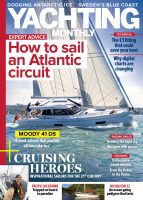The Atlantic Orca Working Group has issued new advice to skippers after over 45 interactions between boats and the killer whale off Spain and Portugal in the last year
New advice has been issued to skippers on how to deal with killer whale interactions.
It comes following reports of juvenile killer whales, also known as orca, touching, pushing and pivoting on boats off the Spanish and Portuguese coasts last year.
In some cases this disruptive behaviour by the orcas resulted in damage to the stern, mainly on the rudder.
Between July-November 2020, 45 interactions were recorded between the Strait of Gibraltar and Galicia in Spain.
The incidents happened between 2-8 miles off the coast and mainly involved boats which were 50ft/15m or under and were either sailing or motorsailing.

The broken tow rope after an orca slammed into a Hallberg-Rassy under tow. Credit: Halcyon Yachts
The crew were motorsailing, and the orca targeted the rudder before spinning the boat 360°.
Once the engine was turned off the orca disappeared, only to return when the yacht was being towed by A Coruña’s rescue services.
The mammal hit the boat until the tow line broke.
‘Teeth marks’ were found on the bulb keel, although the GRP hadn’t been punctured.
Graeme and Moira Walker, along with crew Steve Robinson were motorsailing their Beneteau First 47.7, Promise 3 off Finisterre at 0645 on 22 September when they endured a 45-minute orca encounter.
The orca focussed on the rudder and keel and only stopped once the engine was turned off.
They believe the mammal was using its back to force a sudden change of direction of Promise 3.
The yacht’s steering was undamaged and they managed to sail to A Coruña where an inspection of the boat found damage to the rudder.
Two new cases have also been recorded in January 2021 on the Atlantic coast of Morocco and the Strait of Gibraltar.
The Atlantic Orca Working Group said these further incidents confirmed ‘the urgent need for specific actions on the international coordination between administrations, mariners and scientists to avoid any future harm to people, whales and boats.’
It has now drawn up a map of killer whale interactions, and issued a list of safety protocols for skippers.
If an orca is spotted and begins to interact with the yacht, sailors are advised to:
- STOP the boat (take down the sails), leave the wheel loose; if sea conditions and pilotage allows;
- Contact the authorities (by phone on 112 or by VHF Channel 16);
- Take your hands off the wheel and stay away from any part of the boat that may fall or turn sharply;
- Don’t not yell at the animals, do not touch them with anything, do not throw things at them, do not let yourself to be seen unnecessarily;
- If you have a camera phone or other device, record the animals, especially their dorsal fins, to be able to identify the annals afterwards. All information should be sent to: gt.orcas.ibericas@gmail.com;
- Only after a while, when you do not feel pressure or nudges on the rudder, check that it turns and works;
- Contact the authorities if you need a tow either by phone on 112 or by VHF on Channel 16;
- Make notes of the interaction, record the date/time and your position.
Orca are protected in Spanish waters.
Legally, boats can only approach cetaceans smoothly, at a maximum speed of 4 knots, from behind and at an angle of 30º.
Continues below…
Are whales & orcas really a threat to cruisers?
As orca interactions with small sailing yachts rise, Katy Stickland investigates if orcas and whales are really a threat to…
A sailor’s guide to whales and dolphins
Spotting wild whales and dolphins while sailing is a joy, says marine conservationist Anna Moscrop
Sailors urged to report incidents of marine wildlife harassment
The charity Whale and Dolphin Conservation is warning water users not to disturb or harass marine wildlife and to report…
Cruising after Brexit and sailing in Europe
As Europe begins to open up again for cruising, Lu Heikell looks at the implications of Brexit on UK sailors…
Skippers must maintain a parallel trajectory during the encounter, without abruptly changing speed or direction.
The killer whales of the Strait of Gibraltar have a low number of mature individuals within the pod.
They are catalogued as vulnerable by the Spanish Ministry of Environment and were assessed as Critically Endangered by the IUCN Red List in 2019.
The orcas do migrate north, and are most often spotted while hunting for the endangered Atlantic bluefin tuna.
NB This article was updated. Initially it referred to killer whale as whale when in fact they are part of the dolphin family.
Enjoyed reading Killer whale interaction advice issued to skippers?
A subscription to Yachting Monthly magazine costs around 40% less than the cover price.
Print and digital editions are available through Magazines Direct – where you can also find the latest deals.
YM is packed with information to help you get the most from your time on the water.
- Take your seamanship to the next level with tips, advice and skills from our experts
- Impartial in-depth reviews of the latest yachts and equipment
- Cruising guides to help you reach those dream destinations
Follow us on Facebook, Twitter and Instagram.









